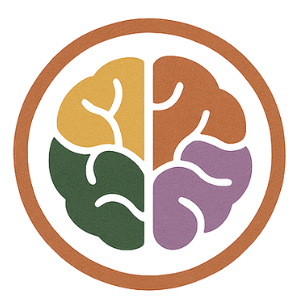Masking as a Neurodivergent Therapist-in-Training
Masking has been with me for as long as I can remember.
It shows up in tiny, almost invisible ways: nodding too much, forcing eye contact, saying “mhm” after every comment, adding extra exclamation points or emojis in texts so no one misreads my tone. I join conversations I do not want to, answer questions I would rather avoid, and push myself to perform social energy at times when my body simply cannot. All of it is meant to make me appear “friendly,” “engaged,” or “emotionally available.” It is meant to prevent conflict, misinterpretation, or rejection. But it comes at a cost. One I feel in every part of my body.
Masking is not only social; it is physical and sensory too. I ignore my body when it signals pain or exhaustion, skip meals, push through migraines, and deny myself quiet alone time. I suppress crying and other natural emotional responses. These behaviors do more than tire me; they interfere with the very self-care activities that keep me regulated. My migraines, brain fog, and emotional shutdowns are not random; they are the predictable results of living against my own neurology.
Masking also erodes boundaries. I overextend myself to avoid disappointing others. I respond to texts I do not want to answer because I feel obligated. Over time, this builds self-doubt: “Maybe I am overreacting,” “It is not worth asserting myself,” “I am too much.” These thoughts are not truths; they are the consequences of constantly putting others’ comfort above my own.
As I prepare to begin clinical work, these patterns have become impossible to ignore. Entering this new space, I anticipate the pressures to perform, to appear “professional,” and to mask natural behaviors. Seeking guidance, I reached out to my former therapist that is neurodivergent and whose perspective I deeply trust.
She helped me reframe what I am noticing. She encouraged me to identify the small ways I mask and to create proactive strategies: adjusting lighting, breaking eye contact when needed, taking quiet pauses to collect my thoughts, and disclosing my neurodivergence when appropriate. She reminded me that modeling authenticity is not about performing neutrality; it is about being consistent, transparent, and showing clients that the space is safe. She also suggested reflecting on which interactions may feel energizing versus draining and structuring my practice to protect my well-being.
This proactive reflection has been liberating. Masking is not just a social habit; it is a response to a world that does not always accommodate difference. As I prepare to step into clinical work as a neurodivergent therapist, the challenge is not to erase my difference, but to protect it, model it, and honor it in the work I do. Masking may have been necessary once, but the work ahead is different. It is about reclaiming my space, showing up authentically, and demonstrating to myself and others that being made differently does not mean being made wrong.
Come as you are, take what you need. I’ll be here.
